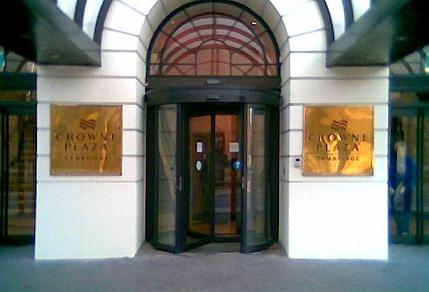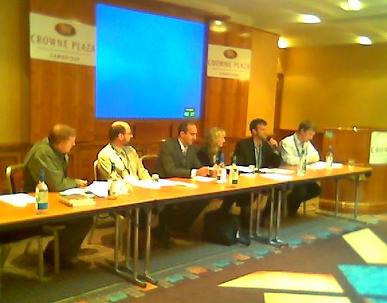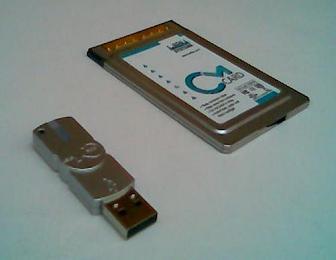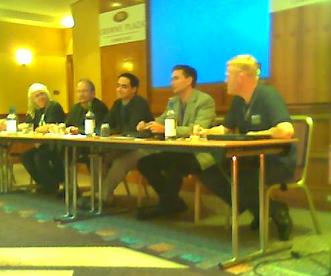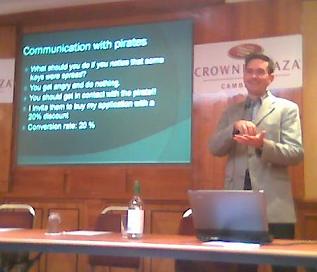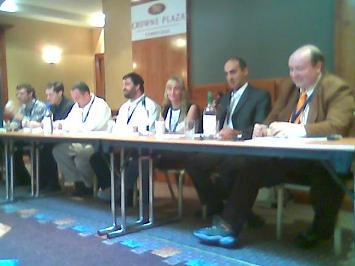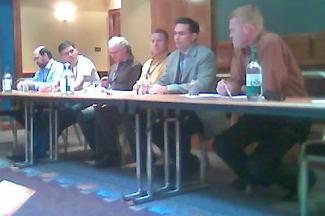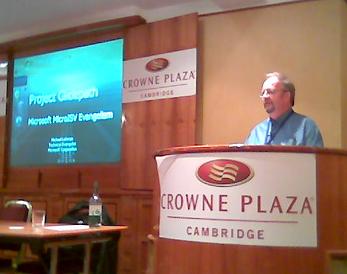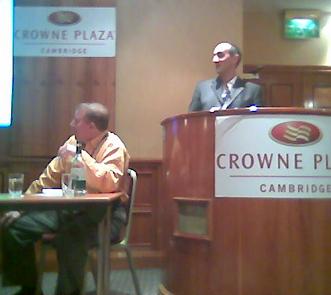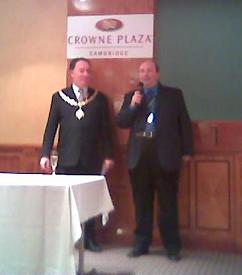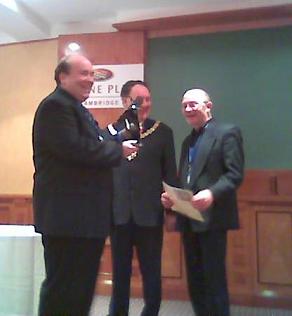European Shareware Conference 2006 (Cambridge UK)
| Home page |
| What is Uberbot |
| What is Ubercode |
| Free trial |
| Ubercode store |
| Testimonials |
| Tech support |
| Forum |
| Links |
| News blog |
European Shareware Conference (ESWC) 2006Over the weekend of the 4th to 5th November, I attended the European Shareware Conference. The conference is aimed at micro ISV's and Shareware Businesses, and is presented in the prestigious (and expensive!) Crowne Plaza hotel in Cambridge, UK. Here's a picture:
The conference started with a discussion of Search Engine Optimization. According to Dave Collins the most important rule is that there are no rules that describe what to do to optimize your site! After presentations from Gary Elfring and Robert Martin, there was a very interesting panel session:
From left to right, the panel consists of Bob Walsh (Moderator), Gary Elfring (Elfring fonts), Dave Collins (Shareware promotions), Sharon Housley (Notepage), Phil Schnyder (Avanquest), and Robert Martin (Infacta). The panel talked about the most important opportunities for micro ISVs in 2006 - 2007. These were:
Bob Walsh then motivated everyone to direct action by asking what immediate things we would do as a result of the panel's suggestions. I won a prize of his book "From Micro-ISV to reality" for committing to test under Windows Vista - thanks Bob! So I have to make a Windows Vista tested version of Ubercode within the next few months, or Bob will ask for his book back! Round about this time some of the power sockets failed because of overload, so I couldn't use my laptop for a while. The overload was because the room was cold so the hotel staff supplied extra heaters:
After lunch (which I ducked out of) Tony Edgecombe talked about building customer trust. Some important lessons are: Always act in the best interests of your customers, offer a Money Back Guarantee, and use Authenticode to sign your EXE files. I am pleased to report Ubercode Software currently does at least two of these! Authenticode signing is even more important with Windows Vista, since unsigned EXEs cause Windows to pop up nasty warnings. The next session is with Marcel Hartgerink (Wibu) who discussed software protection in detail. This is one of the more technical sessions and Marcel's product CodeMeter implements protection based on time, number of uses and number of simultaneous users. The CodeMeter is a hardware based device (dongle). This should be very secure, since it is based on an encrypted USB key or PCMCIA card:
This was followed by the afternoon panel session:
This panel consists of Marck Pearlstone (Brainstorm software), Michael Lehman (Microsoft), Sinan Karaca (Installaware), Thomas Wetzel (Wisco) and Marcel Hartgerink (Wibu systems). Some interesting things emerged from this panel, including the statement that Dot Net v3 is primarily a marketing release based on Dot Net v2 plus Windows FX. Also Michael Lehman of Microsoft confirmed the Windows 32 / 64 bit API is still being implemented in the forthcoming Windows Vista release. Sinan Karaca of InstallAware then showed us his new installer, which is intended for creating MSI (Microsoft Installer) files for Windows. MSI files are Microsoft's new installer technology which works under Windows 2000, XP and Vista. Sinan used to work at Install Shield and was part of a group that left to found their own business. The final session on Saturday was from Thomas Wetzel (Wisco) who discussed Google ad-words. He pointed out it's easy to lose money with Google ad-words since these exist primarily to make money for Google, not for you. Careful use of ad-words requires techniques such as the following:
Sunday 5th November - European Shareware ConferenceTo the surprise of Dave Collins (Shareware Promotions), most people made it to the 9am Sunday morning session! During this session Dave gave a list of do's and don'ts for websites. Here's the list of things you should do:
... and here's the list of things you shouldn't do:
In the next session Thomas Wetzer (Wisco) discussed software protection. I don't understand why German software developers are so interested in this subject, but anyway here is Thomas discussing what to do about software pirates:
By offering them a discount he converts about 20% of them into legitimate users! Here are Thomas's suggestions for software protection:
A lively discussion then took place about what information could be sent back when an application "phones home". Thomas said it was OK to send back personally identifiable information, whereas other people had the view this information should not be sent without customer approval. My personal views on protection are: (1) The only reliable methods are product activation and hardware locks (2) it doesn't matter anyway since the only purpose of protection is to keep honest folks honest, and you shouldn't spend too long in a war against hackers who have nothing creative to do. At 11.00 the e-commerce panel kicked off:
From left to right, the panel consists of: Jessy Jex (not visible), Phil Schnyder (Avanquest), Edward Leigh (Osolis), Daniel Kleinburg (Plimus), Guy Wilnai (Plimus), Sharon Housley (Notepage), Dave Collins (Shareware promotions) and David Boventer (ESWC). David thanked everyone for turning up, then questions took place about secure ordering. People are frustrated at having to re-enter credit card details each time when visiting different sites and having to keep track of different passwords and login details. The panel made the point that Microsoft offered the Microsoft Passport / Wallet service which retained credit card details, but Passport had met a lot of opposition. Another useful suggestion was for developers to have several different prices, for example there could be a Lite version and a Professional version, or there could be monthly payment options for more expensive products. During the lunch break, I spoke to Bob Gibson at Tucows software. He helped fix a problem I had with getting the Ubercode download listed on Tucows. Many thanks Bob, and here are the Tucows mascots:
After the lunch break, Dave Collins (Shareware promotions) kicked off at 1.30pm by discussing Google adwords. He made some intersting points:
Following Dave's presentation, the Sunday afternoon panel answered questions on supporting your users:
This panel consists of Gary Elfring (Elfring fonts), Tony Edgecombe (Frogmore), Marck Pearlstone (Brainstorm software), Bob Walsh (My Micro ISV), Thomas Wetzel (Wisco), and Marcel Hartgerink (Wibu systems). Some interesting facts that emerged were:
After the mid-afternoon coffee break, Michael Lehman of Microsoft presented Project Glidepath. This project is aimed at micro ISVs to help them move forwards to Windows Vista. Here we have Michael at the start of his talk:
Project Glidepath helps developers with the following:
The final session for the day is a website critique offered by Dave Collins (Shareware Promotions) and Bob Walsh (My Micro ISV). Here's a picture of Dave warming up to rip someone's site to shreds:
Several people (including me) volunteered to have our sites critiqued. Dave offered useful suggestions to everyone prepared to volunteer their sites, and I think he was disappointed that none of the sites were truly terrible! Sunday evening - ESWC AwardsAfter the conference was over, the Epsilon Award was given to the author of the best shareware program. Here is David Boventer, the efficient and friendly ESWC chairman, deep in conversation with the Lord Mayor of Cambridge:
The Epsilon Award was then presented to Alcohol-Soft.com for their useful CD / DVD backup software. Here is a picture of the presentation of the award:
Well, that's enough about the conference. I learnt a lot during this conference, and would like to say a big Thank You! to everyone who helped me and who gave me feedback. If I have missed anything out or got any details wrong, contact me and I will fix it. |
